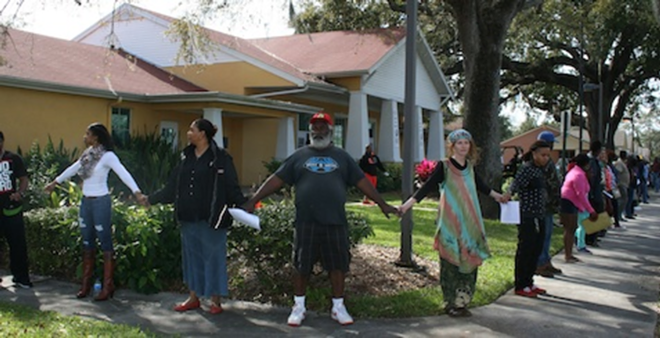
Speaking to a packed south St. Pete church last month, philosopher and social justice activist Cornel West praised a place he had just visited.
“I want to salute where I just was,” he said. “I was just at the Carter G. Woodson Museum.”
About a week later, the St. Petersburg Housing Authority Board, the museum’s landlord, voted 4-3 to sell the big yellow bungalow on 9th Avenue South that has housed it since 2004. The museum was initially funded through a $27,000,000 federal HOPE VI Grant to revitalize the Jordan Park public housing area, where the museum sits.
“This building was dedicated for a specific reason to a specific group,” said Terri Scott, chair of the museum’s board, during a gathering of over 100 supporters at the museum last week. “We can’t begin to tell you how we got here because still to this day we’re perplexed and we’re unknowing.”
Scott and others are scrambling with city officials and a team of lawyers working pro bono to figure out how the museum can stay put.
“We’re hoping the vote can get recalled,” said Shannon Ligon, one of those lawyers. “There are just so many avenues to help reconcile this, so we just want to explore all opportunities before we have to go through litigation.”
The Housing Authority’s board makeup has changed, with Mayor Rick Kriseman’s decision not to reappoint a board member who supported the sale. But it’s unclear whether that change will shift the balance.
Housing Authority Executive Director Darrell Irions, who helped found the museum, said the move is part of a five-year plan to get rid of the agency’s non-residential property.
The museum property’s appraised value is nearly $670,000, said Irions. He said he would like to use that money to help fund affordable housing for military veterans, a project for which the agency is currently a few million short.
The museum, a 501c3, isn’t tied to the house, but he’d love for it to stay — if it can find a new landlord.
“That would be the best-case scenario,” Irions said.
Since the Housing Authority board’s Jan. 22 vote, there’s been no shortage of outrage over the decision, which could essentially spell eviction for the museum.
“Blood, sweat and tears have already paid for this building,” said Pinellas County School Board member and former City Councilwoman Rene Flowers. “There have been exhibits of all walks of life in this building. Poetry, art. Children have come through this building to see the historical relevance that African Americans have for St. Petersburg, a place where once I couldn’t even sit on a green bench downtown.”
Named for the African-American historian and writer who came up with what would eventually become Black History Month, the museum pays $100 a month to occupy the space. Within its walls are areas for exhibits and events. Currently on display is a collection of black-and-white portraits of local residents and officials. Book signings and film screenings are among the events that have been held there.
Behind the building is a lush expanse of grass lined with trees and flowers. A paved pathway winds through it, dotted with engraved bricks sold to help fund the museum.
Other money covering its roughly $35,000 budget comes from donations and rental of the space for events, including weddings, and the city. In 2013, the city gave just over $63,000 to the museum via a refund to the Housing Authority of PILOT (Payment In Lieu Of Taxes) money it paid the city to offset its tax impact over 2010 and 2011.
That pays the bills as well as the wages of a part-time office manager. Everyone else volunteers.
“I’ve been here too many times and seen people on that board mopping floors and moving chairs late at night, after an event, for me to criticize them,” said St. Pete City Councilman Steve Kornell. “I want to help them build capacity and help them grow.”
While the museum has a large number of vocal supporters, a few critics think it could do more. City Councilman Wengay Newton, the only African-American councilmember, has caught fire for favoring the land sale. He said he wants a museum that celebrates black history, but he wants to see national accreditation, full-time paid staff and more hours of operation, among other things (currently the museum is open from noon to 5 p.m. Tuesday-Friday).
“You can’t go in there and learn [anything] about Selma,” he said. “You can’t go in in there and learn [anything] about voting rights. They don’t teach them.”
He said he would have supported a proposal to have St. Petersburg College partner with the museum, a proposal that never came to fruition (nobody can agree on why).
To advocates, the museum’s mission is more crucial than ever as the area redevelops and potentially squeezes out the area’s deep African-American roots.
Kornell said that City Council plans to discuss a possible historic designation for the building, which would make it difficult to knock down, and obviously harder to sell. They’re also looking into the terms of the HUD grant for any possible limitations on selling the property. Council will discuss options for protecting the facility during its meeting on Thursday, Feb. 5.
“But even if it’s legally okay to sell the building, it’s legally right and morally wrong,” he said. “It’s not okay. It’s the wrong thing to do.”

